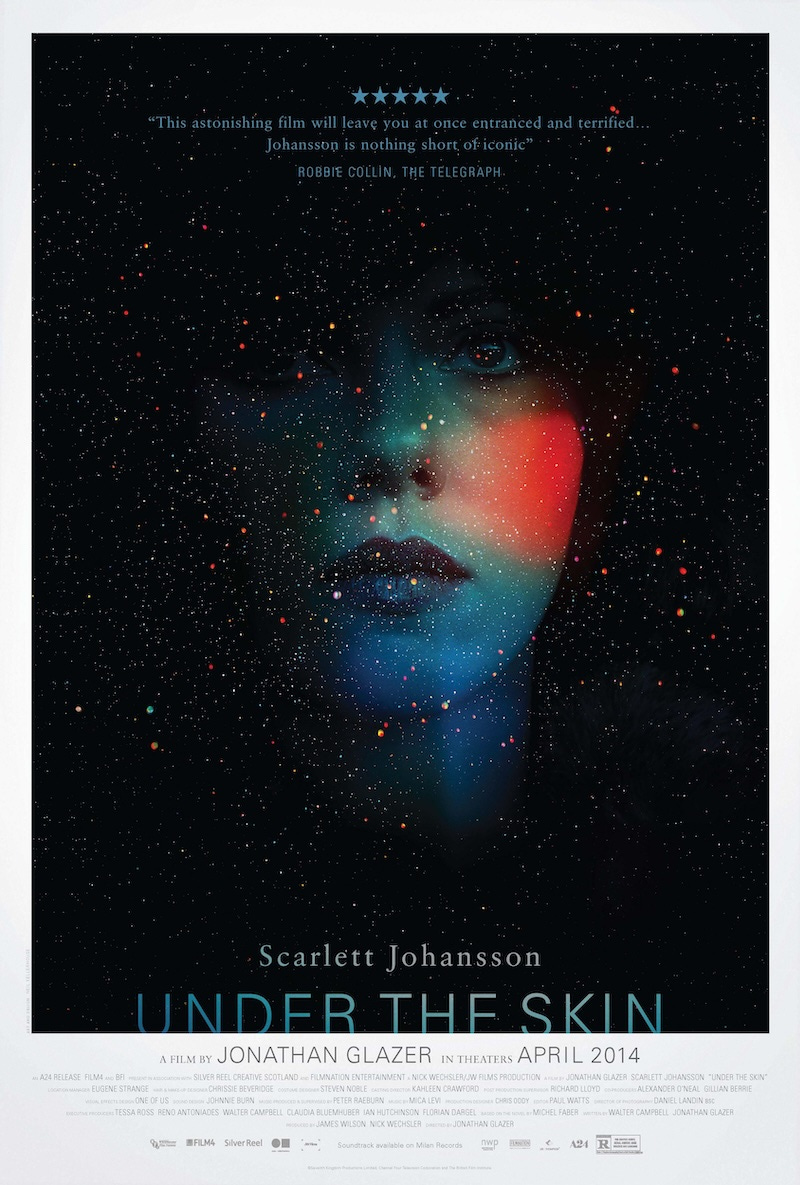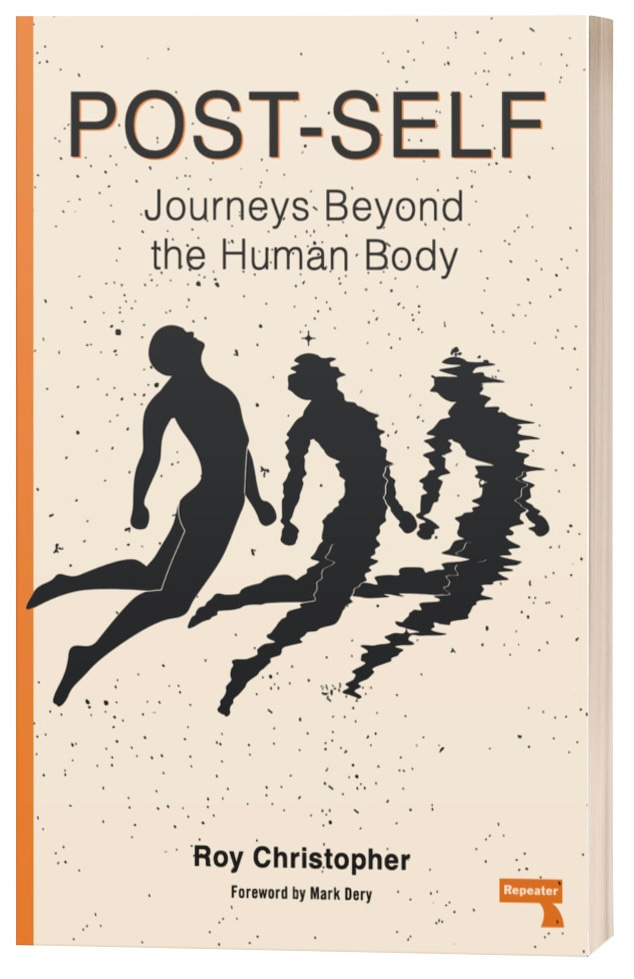What follows is an outtake from my forthcoming book Post-Self: Journeys Beyond the Human Body, which Repeater Books will be publishing in December. Previously published by punctum books as Escape Philosophy, this new expanded and updated edition includes new additions to each chapter, a new Foreword by Mark Dery, a new Afterword by me, and is now named after an album by its metal muse, Godflesh.
From July 8th to the 11th, you can get it for 25%-off from Barnes & Noble (using code: PREORDER25)! Preorder yours now!
Thank you! Read on!
Blank Solitude: The Alien Gaze
In the twenty-first century, Scarlett Johansson has emerged in film as the ultimate person, the final girl of all the horror that is human. She voiced Samantha, the operating-system love interest of Theodore Twombly, in Spike Jonze’s her. She shook Bob Harris (played by Bill Murray) out of a late-life lull in Sofia Coppola’s Lost in Translation (2003). She repeated Logan’s Run in The Island (2005). She transcends her own brain and body in Lucy (2014). She starred in the live-action version of Ghost in the Shell, (2017). She was Natasha Romanoff, the perfect cyborg assassin in Black Widow (2021). And after playing the lead in Jurassic World: Rebirth (2025), she is now the highest paid actor in Hollywood. In short, when we think of machine-aided human perfection, Johansson is what we picture.
In Jonathan Glazer’s stunning 2014 film, Under the Skin, Johansson plays a man-eating, alien visitor slipped into a human sleeve, a body snatcher of a different kind. Lucy Bolton describes the film as “a viewing experience that is mediated by the emotional, moral and corporeal alien eye.”1 While Glazer’s adaptation is an intriguing interpretation, Michael Faber’s original novel is versatile, lending itself to many others. Taken in tandem though, they inform each other. “[The book] was a jumping-off point,” Glazer tells Chris Alexander at Fangoria.2 “Under the Skin is trying to represent something kind of unimaginable—this infinite and alien entity,” he says. “It’s not something for words, really. It shouldn’t be explained away. Our intention was to protect its alienness.”3 That alienness is key. Mark Fisher wrote about the scene in the movie where Johansson’s alien—nameless in Glazer’s film, but named “Isserley” in Faber’s source novel—sees itself in the mirror: “It is clear now that the mirror scene redoubles the ‘ordinary’ self-objectification that happens when we look in the mirror: the alien is not looking at herself, but at the human body she is wearing.”4 Johansson herself says, “I was one of those kids who used to stare in the mirror until I made myself cry.”5 She says about her first time on a film set at age nine, “I just knew what to do, instinctively.”6 She was always already a movie star.7
In Cool Memories IV, Jean Baudrillard wrote, “the photographic lens makes you immediately indifferent to yourself—you inwardly play dead. In the same way, the presence of television cameras makes what you are saying seem alien or a matter of indifference.”8 Johansson begins an interview with Tim Noakes at Dazed & Confused magazine reading from Baudrillard’s America, his collection about feeling an alien in a foreign land. “Smile and others will smile back,” she reads. “Smile to show how transparent, how candid you are. Smile if you have nothing to say. Most of all, do not hide the fact you have nothing to say nor your total indifference to others. Let this emptiness, this profound indifference shine out spontaneously in your smile.”9 Further down that same page, Baudrillard wrote, “the skateboarder with his Walkman, the intellectual working on his word-processor, the Bronx breakdancer whirling frantically in the Roxy, the jogger and the bodybuilder: everywhere, whether in regard to the body or the mental faculties, you find the same blank solitude, the same narcissistic refraction.”10

Johansson feels that alienness herself. “When I finish work,” she says, “I just want to get as far away from it as possible. It’s like, ‘Okay, we’re done, let me try to regain my sense of self!’[…] I’ve certainly had roles which have become all-encompassing, when I’ve been like, ‘Whoa, where’s my life?,’ and felt like the floor had been swept from underneath me. But the more experience you have, the less carried away you get.”11 As one review of Under the Skin parenthetically notes, “the film is nothing if not a knowing, subversive use of Johansson’s celebrity and screen persona.”12 Celebrity itself produces cyborgs and aliens, prepped by trainers and stylists to become something more than human. They exist in an asymmetrical world, inflated to their audience by a system of interconnected media technologies on one side and alienated from them on the other.
Glazer says of her performance, “when she saw the film, she said to me that she didn’t recognize what she was doing in it. […] [S]he said she had no idea what was going on in her mind at any point.”13 In a film so focused on alienation, it’s interesting that Johansson felt it as the actor, as the alien, and as the viewer of this film. Through the lens, the narcissistic refraction: the alien gaze turned in upon itself.
Preorder POST-SELF: 25%-off at B&N!
Again, the above is an outtake from my forthcoming book Post-Self: Journeys Beyond the Human Body, which comes out in December from Repeater Books!
Here’s what others are saying:
“Too often philosophy gets bogged down in the tedious ‘working-through’ of contingency and finitude. Post-Self takes a different approach, engaging with cultural forms of refusal, denial, and negation in all their glorious ambivalence.”
— Eugene Thacker, author of In the Dust of This Planet
“Through the lenses of Godflesh, J.G. Ballard, UFO phenomena, psychedelics, serial killings, and so much else, Christopher investigates humanity’s growing inclination to escape our bodies, to escape our species, to escape life itself.”
— B.R. Yeager, author of Negative Space
“A peculiar hybrid of Thomas Ligotti and Marshall McLuhan.”
— Robert Guffey, author of Operation Mindfuck
July 8-11 you can get it for 25%-off from Barnes & Noble (using code: PREORDER25)! Preorder yours now!
Your interest and attention is appreciated. Thank you for reading and preordering!
-royc.
http://roychristopher.com
Lucy Bolton, “‘Under the Skin’ and the Affective Alien Body,” in Film-Philosophy Conference 2014: A World of Cinemas, January 2014, 1.
Quoted in Chris Alexander, “The Skin He’s In,” Fangoria Magazine, no. 322, May 2014, 43.
Ibid., 45.
Mark Fisher, The Weird and the Eerie (London: Repeater Books, 2016), 108.
Quoted in Sanjiv Bhattacharya, “Scarlett in Bloom,” New York Magazine, February 5, 2004.
Ibid.
As Maureen Foster writes of the young Johansson, “Here’s a child who is not just talented and full of charm, but who appears to possess—not a wish, nor a dream, but knowledge—that she will one day be a star.”; Maureen Foster, Alien in the Mirror (Jefferson, NC: McFarland, 2019), 100.
Jean Baudrillard, Cool Memories IV: 1995–2000 (New York: Verso, 2003), 107.
Jean Baudrillard, America (New York: Verso, 1988), 34.
Ibid.
Quoted in Tim Noakes, “Under the Skin of Scarlett Johansson,” Dazed & Confused, Spring 2014, 128.
Realcaptainparsnips, “Their Bodies, Ourselves: Bodysnatching and the Male Gaze in Under the Skin,” Groupthink, March 29, 2014.
Quoted in Alexander, “The Skin He’s In,” 130.







Nicely written.